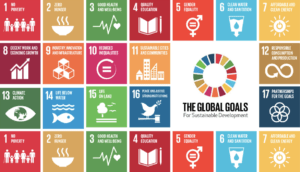Our biggest challenge in this new century is to take an idea that seems abstract – sustainable development- and turn it into a reality for all the world`s people.
—-Kofi Annan, former UN Secretary General

Sustainability is the foundation for today’s leading global framework for international cooperation—the 2030 Agenda for Sustainable Development and its Sustainable Development Goals – SDGs (IISD, 2022).
“Sustainable development is development that meets the needs of the present without compromising the ability of future generations to meet their own needs. “
Communication is undoubtedly indispensable for sustainable development in Africa. The media is a powerful communication outlet or agent in giving voice to the voiceless and vulnerable in society. The open, participatory communication process contribute enormously to better governance, a dynamic civil society, inclusive political discourse, and more crucially to rapid, consistent economic growth. However, communication must be put at the disposal of the poor within the community, national and international levels. A wide-ranging, holistic and strategic approach to communication challenges is needed, together with a political will to address them.
Effective communication is about dialogue, top-down pronouncements, as well as advertisement and not about ‘media management’. The poor need to be able to receive information, but also to make their voices heard. Support for communication in the context of sustainable development therefore involves promoting dialogue in which power-holders listen to, consider, respect and use the knowledge and views of the poor and marginalized in society. A free, pluralistic media environment is important for such dialogue. The media provide a forum for political debate and accountability, and help shape social attitudes for instance to women’s equality. While media freedom and pluralism of ownership do not guarantee ‘voice’ for the marginalised, they are prerequisites if the media are to hold the powerful to account. The essentials of public service media are accessibility (including by poor and marginalised people) and quality content that is accurate, informative, and reflects varied perspectives.
The media, and information and communication more generally, can contribute in particular to four crucial areas of development:
- Good governance
Accessible, accountable and capable governance requires effective communication between government and citizens. Information from the state and public services can help citizens monitor the activities of public authorities. Better communication can also improve administrative communication and the effectiveness and efficiency of public services.
- Efficient and more equitable economies
By improving communication processes, governments can make bureaucratic and regulatory business procedures easier, faster, cheaper and more transparent. Mobile phones and the Internet offer new opportunities for both small and large-scale economic activities, allowing for example small farmers to know what the price of their product is on local and national markets, giving them for example, a stronger negotiating position with intermediaries.
- Inclusive political processes
These require open communication environments and can benefit from use of ICTs and other communication gadgets within the media landscape. Mobile phones, community radios and other commercial electronic and print media tools are increasingly used to strengthen the integrity and credibility of elections, for example.
- A vibrant civil society
Information and communication are fundamental to the formal and informal networks between individuals, groups, institutions and organisations that facilitate public debate and build social capital. Where people are involved and engaged in discussions of issues that affect them, societal attitudes and individual behaviour are more likely to change.
Support to communication processes should focus on strengthening the channels used by poor and marginalized people. This may include strengthening and implementing legal rights to freedom of expression and access to information, supporting the media, and developing and using new opportunities offered by information and communication technologies.
Development planners and African governments must:
- Invest in media development:
The requirements for a diverse, dynamic and free media include, for example, strengthening of media infrastructure, capacity and professionalism; and support for improving the quality and diversity of media content.
- Build more open, transparent information and communication systems and political cultures:
Governments and institutions must accept the reality of an online or virtual world that is transforming politics and civil society in ways that are just beginning, and adapt to citizens’ expectations of openness and the free flow of information.
- Take a holistic view of communication processes and integrate communication into development planning and implementation:
Role of communication must be specified in all development analysis and planning, and sufficient resources of funding, know-how and planning must be invested in the implementation.
- Treat information, communication and the media as public goods and invest accordingly:
Governments should invest in strengthening those areas that the market alone may not provide, such as telephone access for poor people or high-quality public interest journalism.
Credit
https://www.un.org/sustainabledevelopment/development-agenda-retired/
https://www.iisd.org/mission-and-goals/sustainable-development
https://www.gavi.org/our-alliance/global-health-development/sustainable-development-goals
About the Writer
Ebenezer is a Development Communicator with experience in International Development Consulting, SME co-creation & development research and innovative financing.
You can reach him via [email protected] & [email protected]










